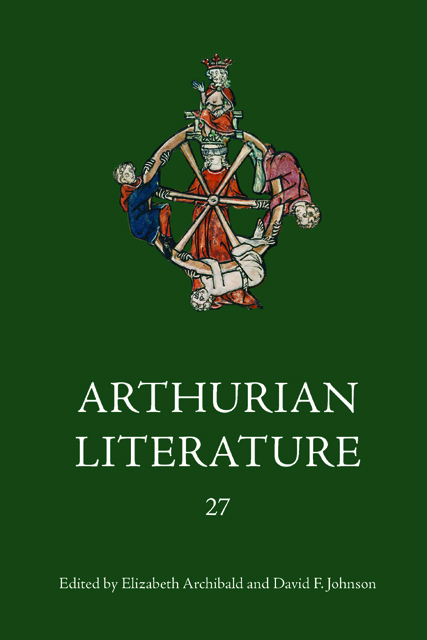Book contents
- Frontmatter
- Contents
- General Editors’ Foreword
- List of contributors
- I Commemoration in La Mort le roi Artu
- II ‘… “if indeed I go”’: Arthur’s Uncertain End in Malory and Tennyson
- III The Intruder at the Feast: Negotiating Boundaries in Medieval Insular Romance
- IV What Women Really Want: The Genesis of Chaucer’s Wife of Bath’s Tale
- V Monstrous Appetite and Belly Laughs: A Reconsideration of the Humour in The Weddyng of Syr Gawen and Dame Ragnell
- VI Speaking (of) Treason in Malory’s Morte Darthur
- VII Lancelot of the Laik: A Scottish Mirror for Princes
- VIII Prince Arthur’s Archers: Innovative Nostalgia in Early Modern Popular Chivalry
- Miscellaneous Endmatter
VII - Lancelot of the Laik: A Scottish Mirror for Princes
Published online by Cambridge University Press: 18 February 2023
- Frontmatter
- Contents
- General Editors’ Foreword
- List of contributors
- I Commemoration in La Mort le roi Artu
- II ‘… “if indeed I go”’: Arthur’s Uncertain End in Malory and Tennyson
- III The Intruder at the Feast: Negotiating Boundaries in Medieval Insular Romance
- IV What Women Really Want: The Genesis of Chaucer’s Wife of Bath’s Tale
- V Monstrous Appetite and Belly Laughs: A Reconsideration of the Humour in The Weddyng of Syr Gawen and Dame Ragnell
- VI Speaking (of) Treason in Malory’s Morte Darthur
- VII Lancelot of the Laik: A Scottish Mirror for Princes
- VIII Prince Arthur’s Archers: Innovative Nostalgia in Early Modern Popular Chivalry
- Miscellaneous Endmatter
Summary
Lancelot of the Laik, a fifteenth-century Scottish romance, is uniquely situated within the context of Arthurian romances and the mirrors for princes tradition. A passage within this poem gives direct advice to Arthur dealing with the administration of justice and the need for generosity, advice commonly found within the mirror for princes genre. These texts advised kings on proper behaviour and the governing of their realm and were especially popular from the twelfth century to the fifteenth century throughout Western Europe. Some of the texts used stories of kings from biblical and classical periods as positive or negative exempla for the proper conduct of kings. Although the advice to princes texts often contained stories as exempla, it is far less common to find a romance with an actual mirror for princes text within, making Lancelot of the Laik an unusual intersection of these two genres.
Several scholars have cautioned modern readers against drawing connections too narrowly to the contemporary political scene of Lancelot of the Laik. It is true that the advice section is stated in general terms, as is the case in much advice to princes literature, rather than directly invoking specific contemporary circumstances. However, even though the advice provided is of a generalized nature, that does not preclude the possibility of it being directed at a particular king. In Fictions of Advice Judith Ferster has shown that couching criticism of kings in bland, general terms was often a cover for the criticism which the author might not want to be so easily transparent. These indirect statements allowed the author plausible deniability in case someone took exception to the writing. Because the mirror for princes literature contained wide-ranging advice covering almost any situation, the author's choice of which advice to include and which to exclude provides a commentary as to the specific purpose of the text. Thus the choices made by the author of Lancelot of the Laik should be more closely examined in comparison to its contemporary political situation.
This article thus examines how this Arthurian poem enters into and contributes to the discussion of the kingship of James III of Scotland (reg. 1460–88). Although James III was indeed a flawed king, giving the contemporary rumours a foundation, he was not quite the inept king described in later-sixteenth-century Scottish chronicles.
- Type
- Chapter
- Information
- Arthurian Literature XXVII , pp. 135 - 178Publisher: Boydell & BrewerPrint publication year: 2010
- 1
- Cited by

